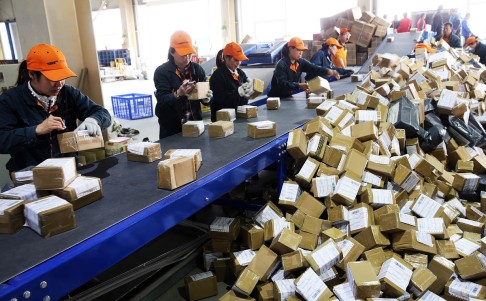
New | Calling all the single ladies: Alibaba’s Singles’ Day shopping spree set to hit new sales record despite slowdown in China’s retail growth
Online shopping giant to bring in new brands, offline retailers and promote products overseas for Chinese consumers’ biggest annual shopping spree on November 11
With giant billboards in subways, posters plastered in elevators, advertisements splashed across newspapers and magazines, and commercials repeatedly being screened during primetime TV and radio programmes, it’s hard to miss the arrival of China’s “Singles’ Day” shopping festival.
The online shopping extravaganza on November 11, started seven years ago by e-commerce giant Alibaba, has become Chinese consumers’ biggest annual shopping spree.
READ MORE: Singles' Day explained: How China's celebration of the lonely became a shopping orgy bigger than Christmas
Despite a gloomy economic outlook as growth slows in the country’s retail industry, this year’s Singles’ Day shopping festival is expected to set yet another new record in takings.
Last year, Alibaba saw a staggering 57.1 billion yuan (HK$69.5 billion) of sales on T-mall and Taobao on November 11. Another major e-commerce site, JD.com, sold out nearly 40 million pieces of products in 24 hours that day.

“Still, it would be hard for the incremental shopping sales brought by the online sales event to offset the decline in growth of the entire retail sector.”
The retail sector’s growth has been sliding in recent years. Total retail sales rose 10.5 per cent to 21.6 trillion yuan for the first three quarters of the year, compared with a 12 per cent increase last year and 13 per cent in 2013.

“It would be hard for the Singles’ Day event to boost the entire retail sector as it’s still too small in the industry,” Yu said. “But as the world’s largest online sales festival, the day is an opportunity not just to boost sales but also to acquire new customers, promote brands and explore new industry trends.”
In 2009, Alibaba picked November 11 – a day meant for people to celebrate being single – to host an online shopping festival in an effort to boost their sales during a traditional low retail season. Only 27 brands took part that first year, slashing prices by half or more on selected products.
The event raked in 52 million yuan of sales that day, surpassing Alibaba’s expectations, and that initial success drew more sellers and buyers the following years as JD.com and other smaller competitors jumped on the bandwagon.
By 2011, the Singles’ Day sales on T-mall had risen to 3.36 billion yuan, with 24-hour sales at a number of individual T-mall stores exceeding 10 million yuan. The event saw more than 400,000 courier staff work round the clock to deliver shopping parcels across the nation.

“This year, we have no pressure [for the final sales figure],” Alibaba founder Jack Ma Yun said as he addressed a Shanghai university last week.
Ma plans to introduce 5,000 brands from Europe, the United States, Japan and South Korea on its T-mall platform for the shopping festival this year. Alibaba will also promote Chinese products to buyers in 64 countries and regions as well as work with offline retailers including Intime Department Stores and Suning Appliance.
This year will also be the e-commerce giant’s first time hosting a gala at Beijing’s Water Cube stadium to expand the Singles’ Day shopping festival’s “cultural content”, according to Alibaba.
“When you’ve put so many promotions together, you have to come up with more creative ideas to bring the event to a while new level,” said Seton Vermaak, head of strategy for digital marketing agency Razorfish.
“The idea of a gala seems a smart one as it will attract people’s attention and anticipation worldwide.”
